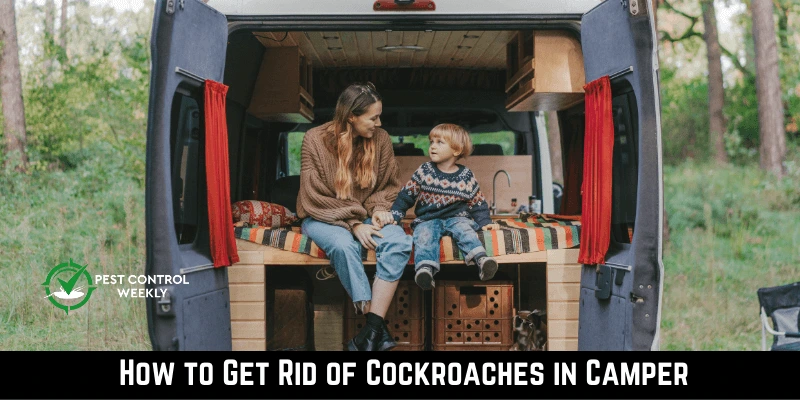When do you hope to go camping? If so, it’s important to know what kinds of pests you might encounter, like cockroaches. Roaches are a major annoyance, and they can even put your health at risk if they find their way into your food or belongings. Most people here want to know how to get rid of cockroaches in camper
There are many easy and effective ways to get rid of these annoying bugs for good.
- Clean the camper thoroughly
- Seal entry points
- Use cockroach baits and traps
- Use insecticide
- Hire a professional exterminator
In this article; we’ll explore some effective methods for eliminating cockroaches from your camper and keeping them from returning. So, if you’re ready to say goodbye to these unwelcome visitors, read on!
What Kinds Of Cockroaches Could You See On The Camper?
Several species of cockroaches could potentially invade your campsite when camping. Here are some of the most common:
German Cockroach
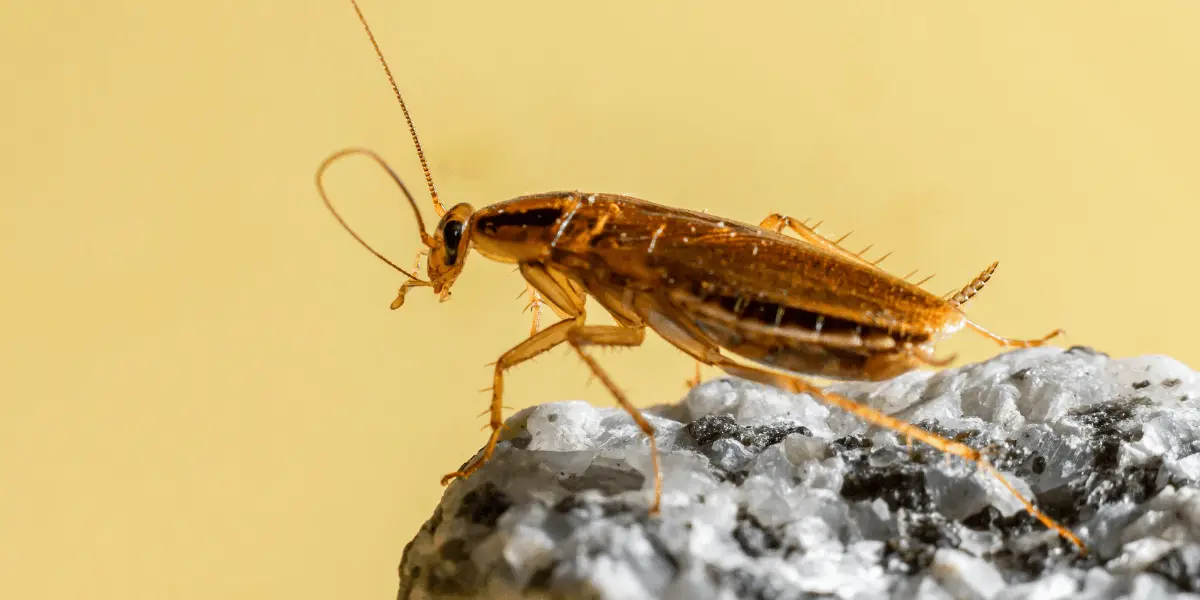
The German cockroach is one of the most common cockroaches you might see on your camper. These pests are light brown or tan and have two black stripes on their backs.
German cockroaches are known for reproducing quickly, so getting rid of the problem as soon as possible is important.
Brown-Banded Cockroach
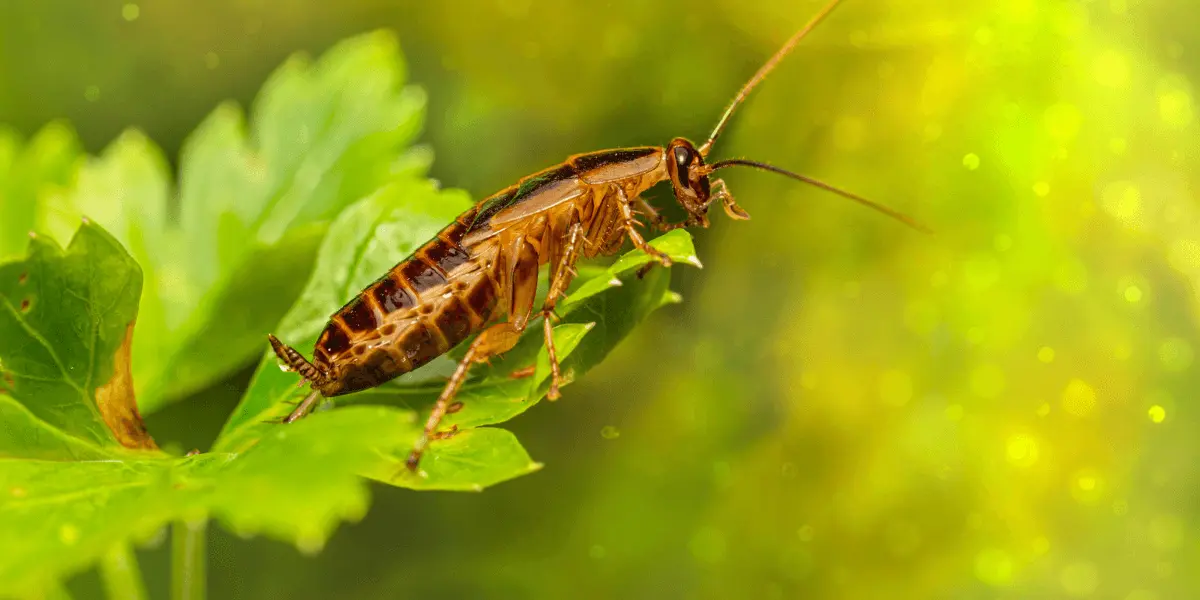
The brown-banded cockroach is another type you might see on your camper.These pests are smaller than German cockroaches and have a light brown color. They are known for their distinctive bands on their wings and abdomen.
Oriental Cockroach
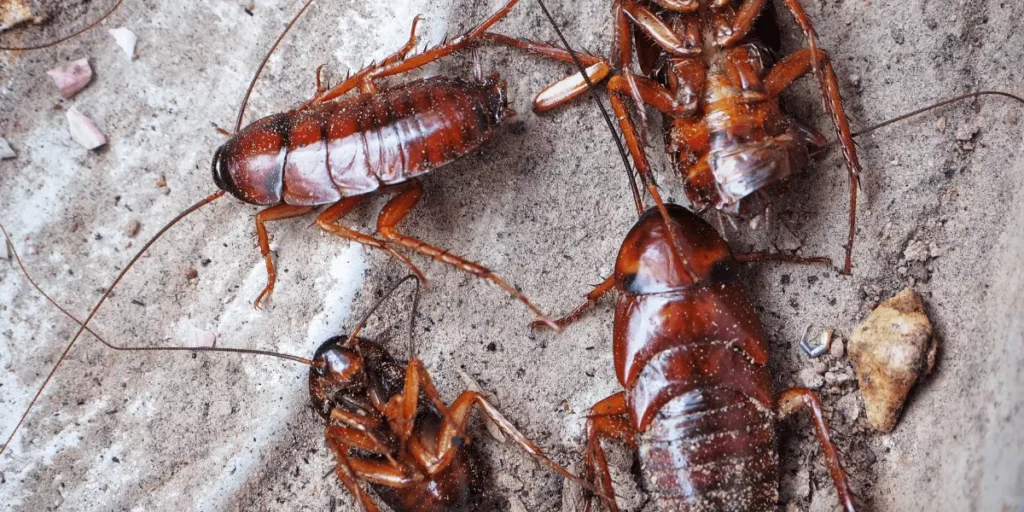
The oriental cockroach, also known as the water bug, is another type of cockroach that can be a problem on your camper. These dark brown or black pests are larger than German cockroaches. They prefer damp areas and can often be found near water sources.
American Cockroach
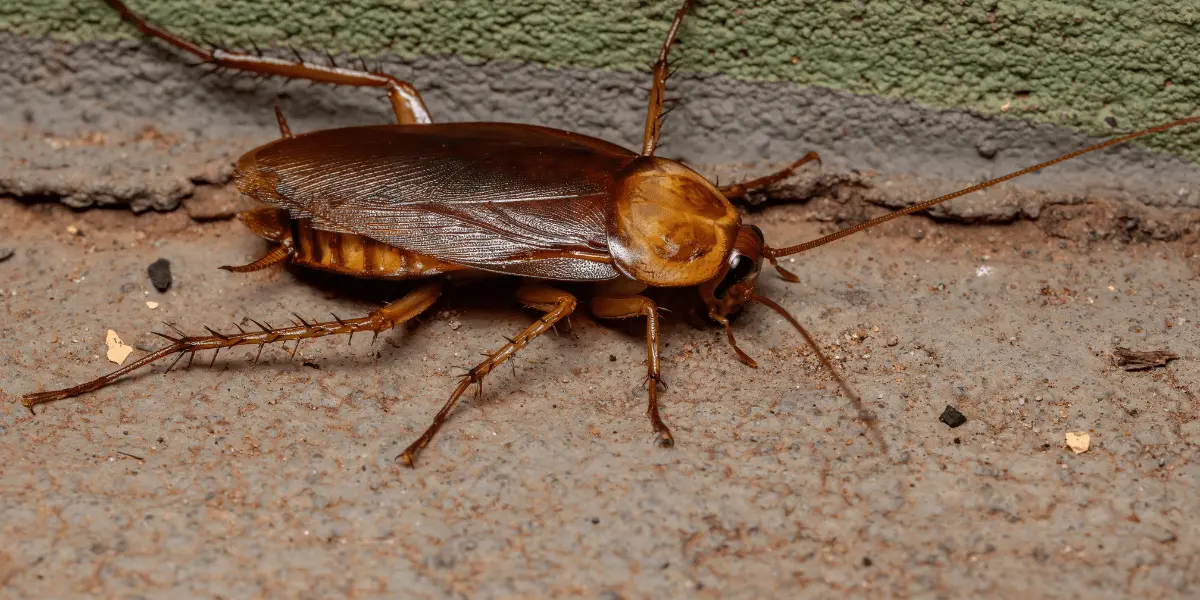
The American cockroach is the largest type you might encounter on your camper. These reddish-brown pests have a distinctive yellowish figure-eight pattern on their backs. They prefer warm, moist environments and are often found in sewers or other damp areas.
What Attracts Cockroaches To A Camper?
Before we get into what attracts cockroaches to a camper, we must comprehend the nature of these pests. Cockroaches like warm, damp places, so campers are a great place to live. They are also attracted to food sources, especially those with a lot of sugar and starch.
Food Sources In A Camper

One of the key factors that attract cockroaches to a camper is the availability of food sources. People who go camping often bring cans of food, biscuits, cereal, and other high-sugar and high-starch foods. Cockroaches are attracted to these foods and can quickly infest your camper if they find a food source.
Moisture And Humidity
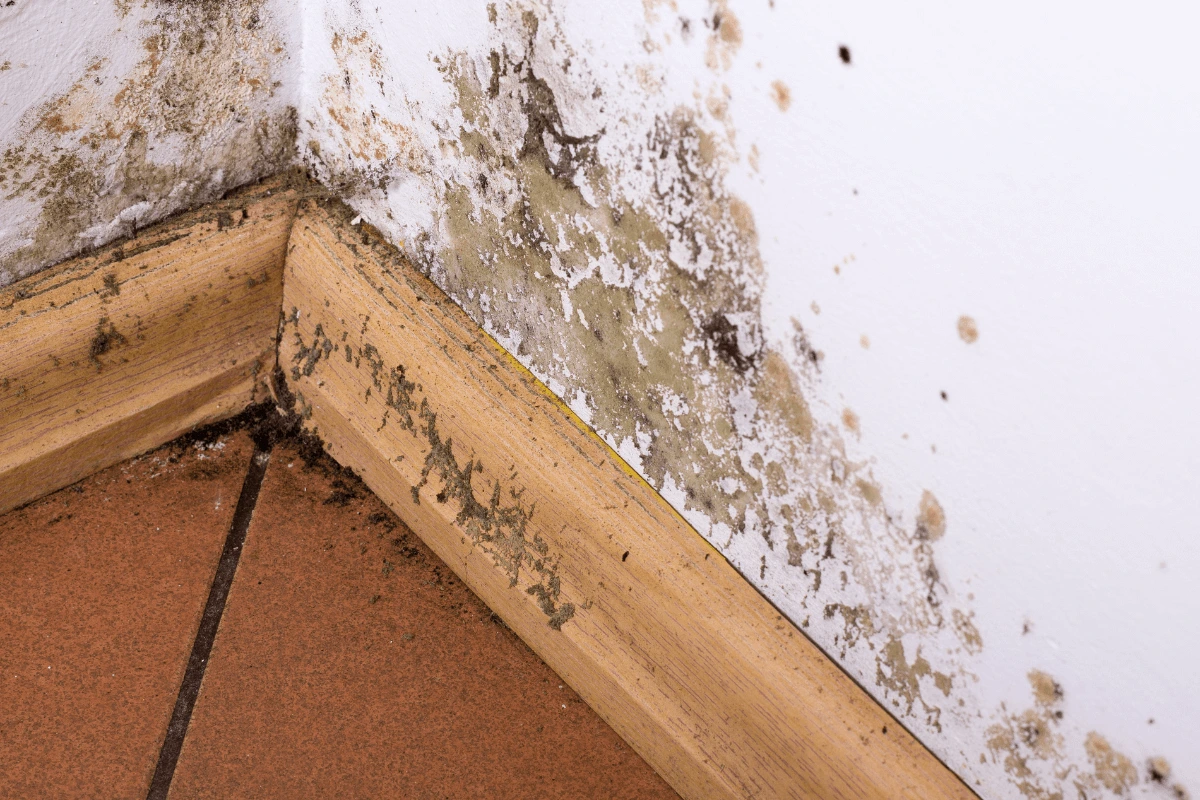
Moisture and humidity also attract cockroaches, which is why they are often found in kitchens and toilets. If your camper has a leaky faucet or pipe, it can create a moist environment perfect for cockroaches to thrive in.It is important to fix leaks or water damage as soon as possible to prevent cockroach infestations.
Clutter And Dirt

Cockroaches are attracted to clutter and dirt, as these areas provide them a place to hide and breed. If your camper is cluttered with boxes, newspapers, or other items, it can provide the perfect breeding ground for cockroaches.Maintaining a clean and organized camper can go a long way towards eliminating cockroach infestations.
Signs Of Cockroaches In A Camper
Following are the physical and behavioral sings of roaches in a camper:
The Physical Signs
Cockroach infestation in a camper are pretty straightforward. Look for droppings, which resemble small, black pepper flakes, and shed skin, which is translucent and papery. Egg cases, which are small and oval-shaped, and dead cockroaches.
These signs are usually found where cockroaches are likely to hide, such as under cabinets, behind appliances, and in dark corners.
The Behavioral Signs
In addition to the physical signs, there are behavioral signs of cockroach infestation in a camper.
If you see cockroaches during the day, there are probably many more than you think. You may also notice an unusual odor, often a musty, oily smell. Finally, you may hear rustling or scratching noises, particularly at night.
How Can I Prevent Cockroaches From Entering My Camper?
Prevention Tips
- Preventing cockroach infestation in a camper starts with keeping it clean.
- Cockroaches are attracted to food and moisture, so clean up spills and crumbs immediately, and store food in sealed containers.
- You should seal up all cracks and gaps in your camper, as cockroaches can fit through even the tiniest openings.
- Finally, you can use cockroach repellents, such as boric acid or diatomaceous earth, to keep these pests at bay.
Ways To Get Rid Of Cockroaches In A Camper
1. Keep Your Camper Clean
Maintaining cleanliness is the first step to keeping cockroaches out of your camper. Cockroaches are attracted to food crumbs, spills, and other sources of food. Therefore, keeping your camper clean and free from any food debris is important. Ensure to sweep the floors, wipe down the countertops, and immediately clean up any spills.
2. Seal Up Any Cracks and Holes
Cockroaches can enter your camper through small cracks and holes. Therefore, it is important to seal up any openings in your camper. This includes sealing around doors and windows and any gaps in your walls, floors, and ceilings. Use caulk or weatherstripping to seal up these areas.
3. Use Cockroach Baits and Traps
Cockroach baits and traps are effective ways to get rid of these pests. Baits attract cockroaches with a food source that is laced with insecticide. Once the cockroaches eat the bait, they will return the insecticide to their nest, killing the entire colony. Traps, on the other hand, capture cockroaches when they crawl into them. These methods are safe and easy to use.
4. Insecticides
If you already have a cockroach infestation in your camper, you’ll need to use an insecticide to get rid of them. Here are some of the best insecticides for cockroaches in a camper:
Advion Cockroach Gel Bait
Advion Cockroach Gel Bait is a popular choice for getting rid of cockroaches in a camper.
The gel bait attracts cockroaches and then kills them once they ingest it. This product is easy to use and can be placed in areas where cockroaches are likely to hide behind appliances and under sinks.
Harris Boric Acid Roach and Silverfish Killer
Harris Boric Acid Roach and Silverfish Killer is another effective insecticide for getting rid of cockroaches in a camper. The product contains boric acid, which is toxic to cockroaches but safe for humans and pets. It can be applied in cracks and crevices where cockroaches are likely to hide.
Combat Max 12-Month Roach Killing Bait
Combat Max 12 Month Roach Killing Bait is a long-lasting insecticide that can help get rid of cockroaches in a camper. The bait contains a slow-acting poison that the cockroaches take back to the nest, killing off the entire colony. This product can provide up to 12 months of protection against cockroaches.
5. Call a Pest Control Professional
If all else fails, you can always call a pest control professional to get rid of cockroaches in your camper. These professionals have the expertise and equipment to effectively eliminate these pests from your camper.
Natural Remedies For Getting Rid Of Cockroaches In A Camper
1 -Borax
Borax is a natural mineral that is toxic to cockroaches but safe for humans and pets. You can make a paste by mixing borax and sugar in equal parts and place it in areas where you have seen cockroaches. The sugar will attract the cockroaches, and the borax will kill them. You can also sprinkle borax along the baseboards, behind appliances, and in cracks and crevices.
2. Essential Oils
According to Journal of Pesticide Science essential oils like peppermint, eucalyptus, and lavender are natural insecticides that can repel cockroaches. You can make a spray by mixing a few drops of essential oil with water and spray it in areas where you have seen cockroaches. You can also place cotton balls soaked in essential oils in areas where cockroaches are likely to enter.
3. Diatomaceous Earth
Diatomaceous earth is a natural powder that is made from fossilized algae. It is safe for humans and pets but deadly to insects. You can sprinkle diatomaceous earth in areas where you have seen cockroaches. The powder will dehydrate the cockroaches, causing them to die.
4. Coffee Grounds
Coffee grounds are a natural cockroach repellent that can keep them away from your camper. You can place coffee grounds where you have seen cockroaches or around your camper’s perimeter. The strong smell of coffee grounds will repel cockroaches and keep them away.
5. Baking Soda
Mix equal parts of baking soda and sugar and sprinkle the mixture in areas where cockroaches frequently. The sugar attracts cockroaches, and the baking soda kills them. The baking soda is toxic to the cockroaches and will cause them to die of dehydration.
7. Bay Leaves
Bay leaves are a natural cockroach repellent. Simply place whole bay leaves in areas where cockroaches frequent, such as drawers, cabinets, and pantry shelves. Bay leaves have a strong smell that repels cockroaches.
Conclusion
Getting rid of cockroaches in your camper can be a challenging task, but it’s not impossible. By following the above methods, you can effectively eliminate cockroaches and prevent them from returning. Remember to keep your camper clean and seal all entry points to prevent future infestations.
FAQs
How Long Does It Take To Get Rid Of Cockroaches In A Camper?
How long it takes depends on how bad the problem is and what you do to get rid of the cockroaches. Some treatments may take a few days, while others may take a few weeks. To get rid of all the cockroaches, it’s important to be patient and keep at it.
Where Do Roaches Hide In Campers?
Cockroaches can hide in many places in a camper, like crevices and holes, behind appliances and cabinets, or in areas that are cluttered or dark. They like places that are warm and damp, so the bathroom and kitchen are common places for them to hide.
How Do I Clean My Camper After Getting Rid Of Cockroaches?
It’s important to clean your camper thoroughly after getting rid of cockroaches to remove any remaining traces of their scent, which can attract more cockroaches. Vacuum all surfaces, including the floors, furniture, and walls. Wipe down surfaces with soapy water and disinfectant. Pay special attention to areas where cockroaches were found.
What Should I Do If I Still See Cockroaches After Treatment?
If you still see cockroaches after treatment, it’s possible that the infestation was not eliminated. You may need to repeat the treatment or use a different method. It’s also important to ensure you are not inadvertently attracting cockroaches by leaving food out or not keeping your camper clean.
Can Cockroaches Cause Health Issues For Campers?
Yes, cockroaches can pose health risks for campers. They can carry bacteria and other pathogens on their bodies and can contaminate food and surfaces. In some people, exposure to cockroach droppings and debris can also trigger allergies and asthma. It’s important to eliminate cockroach infestations as soon as possible to protect your health.
References
Sierras A, Wada-Katsumata A, Schal C. Effectiveness of Boric Acid by Ingestion, But Not by Contact, Against the Common Bed Bug (Hemiptera: Cimicidae). J Econ Entomol. 2018 Dec 14;111(6):2772-2781. doi: 10.1093/jee/toy260. PMID: 30192952; PMCID: PMC7189974.
Yoon, Changmann & Kang, Shin-Ho & Yang, Jeong-Oh & Noh, Doo-Jin & Pandiyan, Indiragandhi & Kim, Gil-Hah. (2009). Repellent activity of citrus oils against the cockroaches Blattella germanica, Periplaneta americana and P. fuliginosa. Journal of Pesticide Science – J PESTIC SCI. 34. 77-88. 10.1584/jpestics.G07-30.
Zeni V, Baliota GV, Benelli G, Canale A, Athanassiou CG. Diatomaceous Earth for Arthropod Pest Control: Back to the Future. Molecules. 2021 Dec 10;26(24):7487. doi: 10.3390/molecules26247487. PMID: 34946567; PMCID: PMC8706096.
